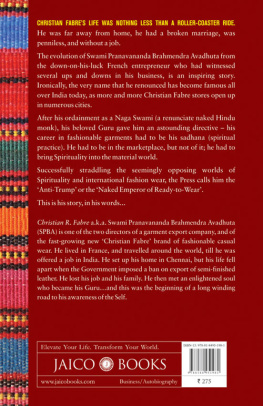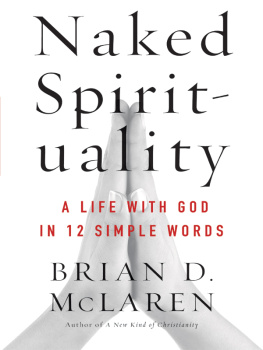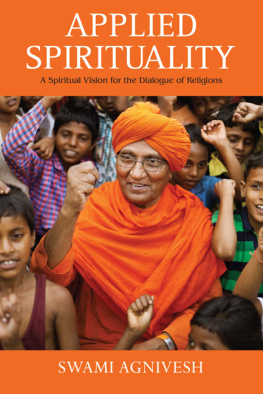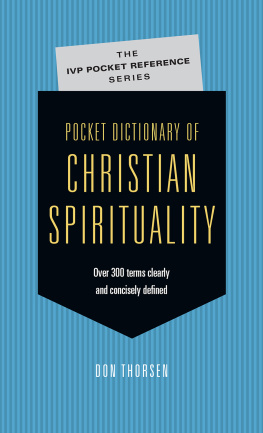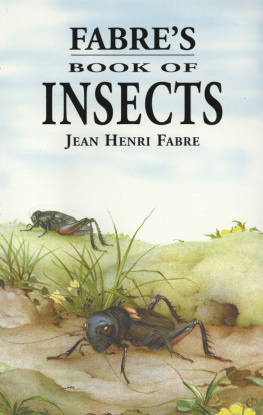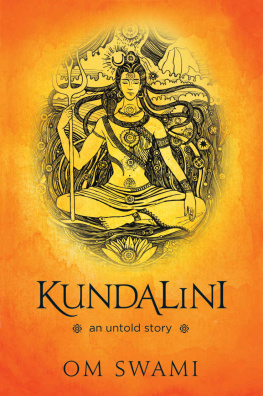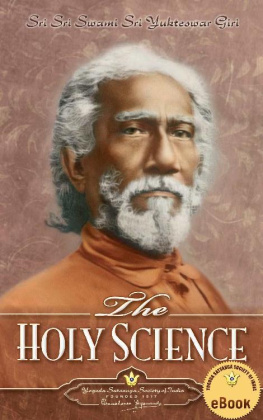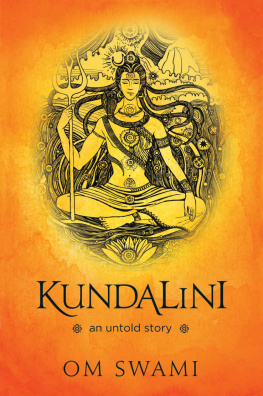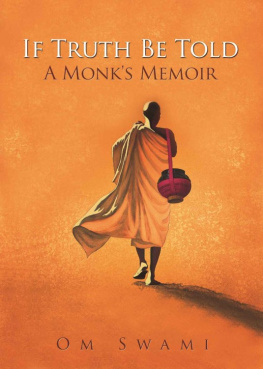
Published by Jaico Publishing House
A-2 Jash Chambers, 7-A Sir Phirozshah Mehta Road
Fort, Mumbai - 400 001
www.jaicobooks.com
Christian Fabre
THE HOLY CEO: AN AUTOBIOGRAPHY
ISBN 978-81-8495-198-1
First Jaico Impression: 2011
No part of this book may be reproduced or utilized in
any form or by any means, electronic or
mechanical including photocopying, recording or by any
information storage and retrieval system,
without permission in writing from the publishers.
INTRODUCTION

A n unsuspecting young Frenchman, by the name of Christian Fabre, landed in Madras in the early '70s. A tumultuous series of paradoxical events led to his becoming a complete destitute with no job, no money, no wife, and no son, to becoming Swami Pranavananda Brahmendra Avadhuta, and after many failed ventures, the CEO of a fashion empire. Ironically, it is the very name he renounced that is becoming popular all over India today, as more Christian Fabre stores open in numerous cities.
After his ordainment as a Naga Swami (naked Hindu monk), his beloved Guru gave him an astounding directive his career in fashion apparel had to be his sadhana (spiritual practice); he had to be in the marketplace, but not of it; to bring spirituality into the material world.
Successfully straddling the seemingly opposing worlds of spirituality and international business, the press calls him the 'anti-Trump' or the 'naked emperor of ready-to-wear'.
This kind, loving, and generous maverick has founded his company on the principles of love, honesty, and respect. From the huge profits they turn over, he pays himself only 200 Euro a month and owns nothing personally. He directly, and indirectly, employs many people. Once a month he retreats to his hermitage for a week where he is free to roam naked, and be one with Nature.
Here is his life's story, in his own words...
YOUVE CERTAINLY COME A LONG WAY

Year: 2008
Wow! What a view!
Cape Town spreads down the slope of the Table Mountain to the ocean, where in the distance, soon to be covered by a blanket of low clouds, is Robben Island. That is where Nelson Mandela, like many others who dared to rebel against apartheid, spent many years of their lives. On the windy top of the mountain, our team of designers, Sai, Linto, and Ani; one of our executives Benhur (yes, that is his name); my assistant John; and I, are happily posing for pictures with this great city below us and the clouds above serving as the backdrop. Rolling down to the sea, we first see the colourful little houses, then further down are the tall buildings of the city centre, and then the harbour. To the right is the huge stadium where the Soccer World Cup 2010 took place. This spectacular view stirs my mind and takes me back to the years I spent in Madras, South India, where I lived once, starving, fighting against all odds, not knowing what to do next to survive. Never would I have dreamt that one day I would be standing here in Africa with such a talented team. I thought to myself, you certainly have come a long way...
This specific trip was brought about by a journalist and his team from Channel 4 who came to Chennai and then to our hermitage to shoot a documentary for Discovery Channel, which was later shown in more than 75 countries. It was only after it was aired that I understood that the documentary was a series about very rich famous men! This was quite ironic, because they were featuring me, a man earning not more than 200 Euros per month, clubbed together with these multi-millionaires! I was shocked. However, the documentary had drawn the attention of many people from different countries. To this day, I receive messages from around the world. Most messages are positive, some of them are from people asking for help, and very few are from people interested in the spiritual aspect of what we do. Some viewers wanted to see if they could do business with us. They didn't seem to realise from the documentary that I do not own anything and that all the profits our company makes, is distributed amongst the workers.
But, the mere prospect of our 'Christian Fabre' brand being distributed and sold in South Africa was very interesting for us, because the people who had made this proposal had showed real interest in our profit-sharing system. So, in January 2008, we decided to visit our friend Tom, his partner Nico and his charming wife Christie, to see how we could work together.
We had a marvellous reception in South Africa and also shot a programme for Top Billing, a popular local television show, and gave interviews to a local magazine that had the largest circulation in South Africa. We were put up in a luxurious hotel on a wine farm and our whole team relished the good food and drink. How lucky we felt to have this 'holiday cum work' opportunity.
We were taken to beautiful places around Cape Town and our team beamed with happiness on being treated like royalty. It gave us not only hope, but also the desire to be able to do good business in a country we did not know at all, which looked so promising to us.
Unfortunately, the financial turmoil, which began in July 2008, affected South Africa as well and forced us to put this dream in abeyance, awaiting a better moment. I still have not lost hope that we will succeed there as soon as the global economic picture stabilises and improves.
Nevertheless, let's go back to the very beginning of this journey to what I remember about my childhood.
MY SUPER SHIRTS

I was born on June 8, 1942, in Beziers, Languedoc, southern France, to great loving parents. My father was a self-made man. When he was 15, his mother had run away with another man, leaving her husband and abandoning her five children. My father had to stop studying, and start working to help support his brothers and sisters. His hunger for knowledge was such that he devoured whatever book he could lay his hands on. He would read to us passages that he particularly liked, or that had touched him. He was a cabinet-maker and made graceful Louis XV- style chairs, but out of economic necessity at the time, he was employed with the French National Railways (SNCF). We never had any sophisticated toys, but he made fantastic ones with wood. I still remember a beautiful airplane with propellers. I was much envied by my friends for that. I was and still am very proud of my father.
My mother was of Spanish origin. Her parents had run away from the Civil War and landed in Beziers, where she met my father, a French man of pure Languedoc roots. They raised their four children with very little money, but the family spirit, which is a rare thing in France today, nurtured us. I was to find this again in India one day. We were a tightly knit family and always lent a helping hand to each other.
When I was two years old, the SNCF transferred my father to Cerbere, a small picturesque village of about 1000 people, in French Catalona, in the Eastern Pyrenees, just before you cross the border into Spain. Our house clung to the mountain, with the garrigue (bush land) on one side and on the steep slopes down to the blue sea, with dark rocks and secluded beaches that tourists had not invaded and spoilt.
School was at the bottom of the mountain, next to the beach where fishermen had their boats waiting for the next launch. I remember that when I was around four years old, my school friends and I would piss standing on top of the railway bridge onto the cars below. The drivers would think it was raining and would switch on their windscreen wipers.
Next page
